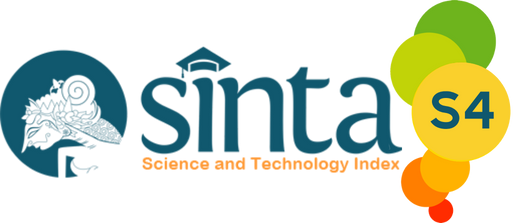Pengembangan e-Modul Panel Surya dengan Solar Tracker Single Axis pada Mata Kuliah Energi Baru dan Terbarukan Universitas Sebelas Maret
Abstract
The Mechanical Engineering Education Study Program FKIP Universitas Sebelas Maret, there is one of the new courses in the 2021 curriculum (independent curriculum, independent campus learning), namely New and Renewable Energy. The learning tools in the course are not yet fully available. Learning tools continue to progress with the times, and e-modules are one of them. In this research developed a new and renewable energy learning e-module with a focus on utilizing solar energy using solar panels. Solar panels used are static solar panels and solar panels with a single axis solar tracker. The purpose of this study is to develop learning e-modules and find out the feasibility to be used in New and Renewable Energy courses. This study uses the Research and Development research method, with a 4-D model research model (Four D model), namely Define, Design, Development, and Disseminate. The Define stage results that the New and Renewable Energy course requires supporting learning tools, in the form of e-modules, e-module users are students of Mechanical Engineering Education class of 2021, with theoretical and practical learning concepts. The Design stage selects the format, drafts, and makes the initial draft. The Development stage tested the design results to two material expert lecturers, and the validation test of two media expert lecturers, then tested to 11 students. In the Disseminate stage, the e-module is submitted to the Mechanical Engineering Education Study Program, Faculty of Teacher Training and Education, Sebelas Maret University, Surakarta. For the results of this development research, in the expert test this e-module material obtained a score of 90.52% with a very decent category, in the media expert test a score of 88.88% was obtained with a very decent category. The results of the trial to students obtained a score of 84% with a very decent category.
Keywords
Full Text:
PDF (Bahasa Indonesia)References
Asmi, J., & Candra, O. (2020). Prototype Solar Tracker Dua Sumbu Berbasis Microcontroller Arduino Nano dengan Sensor LDR. JTEV (Jurnal Teknik Elektro Dan Vokasional), 6(2), 54. https://doi.org/10.24036/jtev.v6i2.108504
Dewi, I., & Lisiani, S. (2015). Upaya Meningkatkan Kreativitas Matematis Siswa Sekolah Menengah Pertama Negeri 5 Terbuka Medan dengan Menggunakan Modul Model Learning Cycle. Jurnal Didaktik Matematika, 2(1), 11–20.
Ernawati, I. (2017). Uji Kelayakan Media Pembelajaran Interaktif pada Mata Pelajaran Administrasi Server. Elinvo (Electronics, Informatics, and Vocational Education), 2(2), 204–210. https://doi.org/10.21831/elinvo.v2i2.17315
Hudha, M. N., Aji, S., & Rismawati, A. (2017). Pengembangan Modul Pembelajaran Fisika Berbasis Problem Based Learning untuk Meningkatkan Kemampuan Pemecahan Masalah Fisika. SEJ (Science Education Journal), 1(1), 36–51. https://doi.org/10.21070/sej.v1i1.830
Idris, M. (2020). Rancang Panel Surya untuk Instalasi Penerangan Rumah Sederhana Daya 900 Watt. Jurnal Elektronika Listrik dan Teknologi Informasi Terapan, 1(1), 17. https://doi.org/10.37338/e.v1i1.94
Jamun, Y. M. (2018). Dampak Teknologi Terhadap Pendidikan. Jurnal Pendidikan dan Kebudayaan Missio, 10(1), 48–52. https://doi.org/10.36928/jpkm.v10i1.54
Mantiri, J. (2019). Peran Pendidikan dalam Menciptakan Sumber Daya Manusia Berkualitas di Provinsi Sulawesi Utara. Jurnal Civic Education: Media Kajian Pancasila dan Kewarganegaraan, 3(1), 20. https://doi.org/10.36412/ce.v3i1.904
Mulyani, F., & Haliza, N. (2021). Analisis Perkembangan Ilmu Pengetahuan dan Teknologi (Iptek) dalam Pendidikan. Jurnal Pendidikan Dan Konseling (JPDK), 3(1), 101–109. https://doi.org/10.31004/jpdk.v3i1.1432
Myori, D. E., Mukhaiyar, R., & Fitri, E. (2019). Sistem Tracking Cahaya Matahari pada Photovoltaic. INVOTEK: Jurnal Inovasi Vokasional Dan Teknologi, 19(1), 9–16. https://doi.org/10.24036/invotek.v19i1.548
Padwa, T. R., & Erdi, P. N. (2021). Penggunaan E-Modul dengan Sistem Project Based Learning. JAVIT : Jurnal Vokasi Informatika, 21–25. https://doi.org/10.24036/javit.v1i1.13
Pratiwi, N. K. (2017). Pengaruh Tingkat Pendidikan, Perhatian Orang Tua, dan Minat Belajar Siswa terhadap Prestasi Belajar Bahasa Indonesia Siswa SMK Kesehatan di Kota Tangerang. Pujangga, 1(2), 31. https://doi.org/10.47313/pujangga.v1i2.320
Rezkyanzah, J., Lasman P, P., & Putra, C. A. (2016). Perancangan Solar Tracker Berbasis Arduino sebagai Penunjang Sistem Kerja Solar Cell dalam Penyerapan Energi Matahari. SCAN (Jurnal Teknologi Informasi Dan Komunikasi), XI.
Sugiyono. (2015). Metode Penelitian Pendidikan (Pendekatan Kuantitatif, Kualitatif, dan R&D). Bandung: Alfabeta.
Suryani, Y. (2018). Penggunaan Model Problem Based Learning Pengaruhnya terhadap Motivasi Belajar dan Kemampuan Berfikir Kreatif. Jurnal Equilibrium, 15, 88–100. https://doi.org/10.25134/equi.v15i01.1074
Thiagarajan, S., Semmel, D. S., & Semmel, M. I. (1974). Instructional development for training teachers of exceptional children: A sourcebook. Center for Innovation in Teaching the Handicapped, Bloomington, Indiana: Indiana UniversityRefbacks
- There are currently no refbacks.








